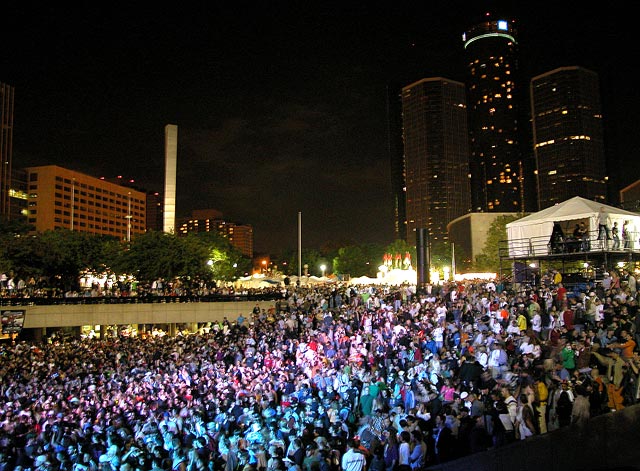Change You Can Believe In (Vol. V, Nos. 6–8). Wiretaps, Journalists and Drugs.
I know in the past I’ve been down on electoral politics and maverick candidates as a means to political change. But man, this guy sounds pretty awesome. I hope he runs for President in the next election, so we can have a chance to change this Administration’s increasingly repressive policies.
. . . This Administration also puts forward a false choice between the liberties we cherish and the security we provide. I will provide our intelligence and law-enforcement agencies with the tools they need to track and take out the terrorists, without undermining our Constitution and our freedom. That means no more illegal wiretapping of American citizens, no more National Security letters to spy on American citizens who are not suspected of a crime. No more tracking citizens who do nothing more than protest a misguided war. No more ignoring the law when it is convenient. . . .
Here is a story for July. From Jennifer Epstein, at Politico.com:
White House opposes defense funding bill amendment.
The White House opposes an amendment to the defense funding bill that would restrict the National Security Agency's ability to collect communications data, press secretary Jay Carney said in a statement Tuesday evening.
We oppose the current effort in the House to hastily dismantle one of our intelligence community's counterterrorism tools,Carney said, referring to the amendment to the National Defense Authorization Act put forward by Rep. Justin Amash (R-Mich.) and backed by Rep. John Conyers (D-Mich.), among others.
This blunt approach is not the product of an informed, open, or deliberative process,Carney said, with no hint to the irony of speaking about a secretive program in such terms.We urge the House to reject the Amash amendment, and instead move forward with an approach that appropriately takes into account the need for a reasoned review of what tools can best secure the nation.–Jennifer Epstein, White House opposes defense funding bill amendment
Politico.com (July 23, 2013)
Of course the President opposes this attempt at a minor restriction on unbridled Executive power. He is the President.
And when you elect a progressive President, you’re going to find that the fact that he is President is always of much greater practical significance than the fact that he claims to be progressive.
Here’s a story for August. One of the things that the progressive President does with the NSA surveillance apparatus that he does not want to hastily dismantle is to target, monitor, and retaliate against dissident journalists.
Leaker Edward Snowden accused the National Security Agency of targeting reporters who wrote critically about the government after the 9/11 attacks and warned it was
unforgivably recklessfor journalists to use unencrypted email messages when discussing sensitive matters.Snowden said in an interview with the New York Times Magazine published Tuesday that he came to trust Laura Poitras, the documentary filmmaker who, along with Guardian reporter Glenn Greenwald, helped report his disclosure of secret surveillance programs, because she herself had been targeted by the NSA.
"Laura and [Guardian reporter] Glenn [Greenwald] are among the few who reported fearlessly on controversial topics throughout this period, even in the face of withering personal criticism, and resulted in Laura specifically becoming targeted by the very programs involved in the recent disclosures," Snowden said for the article, a profile of Poitras.
Snowden didn't detail how Poitras was targeted by the NSA surveillance programs he disclosed, but suggested the agency tracked her emails and cautioned other journalists that they could be under surveillance.
–Jonathan Easley, NSA targeted journalists critical of government after 9/11
Qtd. by J.D. Tuccile, in Reason (August 14, 2013)
Another thing they do with that, as you may recall, is to use it to provide secret leads and evidence for the DEA to double down on the U.S. government’s insane war on drugs
A secretive U.S. Drug Enforcement Administration unit is funneling information from intelligence intercepts, wiretaps, informants and a massive database of telephone records to authorities across the nation to help them launch criminal investigations of Americans.
Although these cases rarely involve national security issues, documents reviewed by Reuters show that law enforcement agents have been directed to conceal how such investigations truly begin – not only from defense lawyers but also sometimes from prosecutors and judges.
The undated documents show that federal agents are trained to “recreate” the investigative trail to effectively cover up where the information originated, a practice that some experts say violates a defendant’s Constitutional right to a fair trial.
–John Shiffman and Kristina Cooke, U.S. directs agents to cover up program used to investigate Americans
Reuters news wire, quoted by Matt Welch at Reason (August 5, 2013)
. . . Which brings us back around to our story for June. From Jacob Sullum, at Reason:
Judging From Prosecutions, Obama is 80 Percent Worse Than Bush on Medical Marijuana
According to a new report from California NORML,
over 335 defendants have been charged with federal crimes related to medical marijuana in states with medical marijuana laws.Despite Barack Obama’s promises of prosecutorial restraint in this area,153 medical marijuana cases have been brought in the 4¼ years of the Obama administration, nearly as many as under the 8 years of the Bush administration (163).In other words, Obama is averaging 36 medical marijuana prosecutions a year, compared to 20 a year under his predecessor. And although Attorney General Eric Holder has repeatedly claimed the Justice Department is not targeting suppliers who comply with state law,the DOJ has targeted many facilities that were in full compliance with local laws and regulations.The overwhelming majority of these cases, 259, involve California dispensaries. California NORML also counts at least 31 cases in Montana, 15 in Nevada, 12 in Michigan, 10 in Washington, six in Oregon, and two in Colorado. Nine out of 10 cases concluded so far have resulted in convictions, with 158 defendants receiving prison sentences totaling more than 480 years. About 50 are in federal prison right now, while others await sentencing or have been sentenced but have not begun serving their time yet.
–Jacob Sullum, Judging from Prosecutions, Obama Is 80 Percent Worse Than Bush on Medical Marijuana
Reason (June 14, 2013)
I had a joke that I used to run in these features that played off our Progressive Peace President's 2008 campaign slogan, which was to close off these posts with some variation on The more things Change....
It seemed funny to me at the time. It's not as funny to me anymore. Because in fact things have not stayed the same, at least not on this front. While campaigning as an alleged supporter of civil liberties — while promising to roll back the abuses of the Bush Administration’s war cabinet — while promising to dial down the rampant drug war and the criminalization of young men of color — and while making one grandstanding lie after another, Obama's government has spent the last five years actively making the situation worse for civil liberties, and for drug war targets, than it was when he entered office. This Progressive
administration’s wholehearted embrace of an authoritarian security state, and expansion of the very policies and programs that they had condemned in the Bush administration, has been aided and abetted by many professional-class Progressive
voters and commentators, who have excused this Administration’s policies, vilified its critics, and pragmatically
embraced its institutionalization of unchecked executive power. By any standard of individual liberty, social equality, or plain old humanitarian compassion, his record in office has been appalling, and those who promoted this Presidency as a means of improving political conditions ought to be embarrassed and apologetic in light of the practical outcome.










